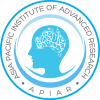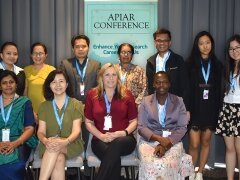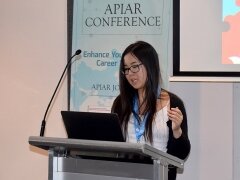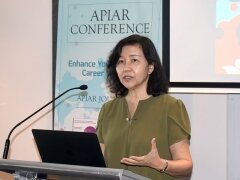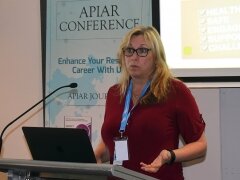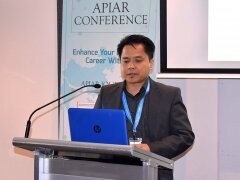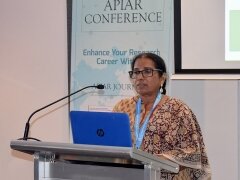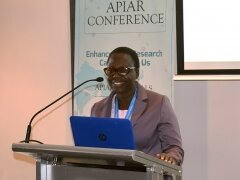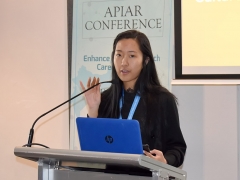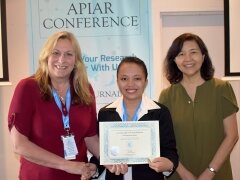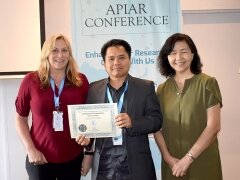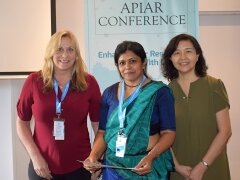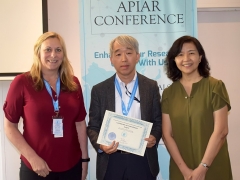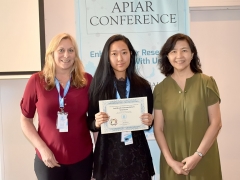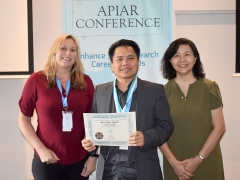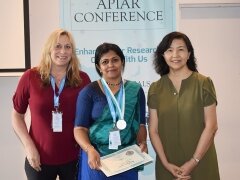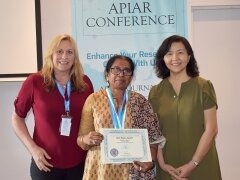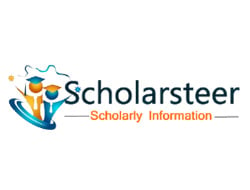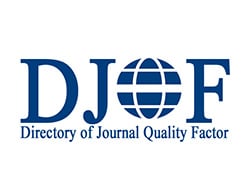1st International Conference on Multidisciplinary Academic Research (ICMAR-2018), Sydney, Australia
DATE: 2018-11-24 - 2018-11-25
VENUE: Rydges Bankstown, Sydney, Australia.
CONFERENCE PROCEEDINGS : ICMAR-2018
FRONT MATTER: ICMAR-2018 (VOLUME 1)
Conference:
Conference: 1st International Conference on Multidisciplinary Academic Research (ICMAR-2018)
Chief Editor: Assoc. Prof. Wan Ng.
Location: Rydges Bankstown, Sydney, Australia.
Date: 24th and 25th of November, 2018
Sponsor: Asia Pacific Institute of Advanced Research (APIAR)
Publisher:
Asia Pacific Institute of Advanced Research (APIAR)
Suite 1A Level 2; 802 Pacific Highway; Gordon NSW 2072; Australia
Document Information:
Document Type: Proceedings Paper
Language: English
ISBN: 978-0-6482404-1-9
Copyright @ 2018, Asia Pacific Institute of Advanced Research (APIAR).
TRADITIONAL PROJECT MANAGEMENT APPROACH, INDUSTRY CHALLENGES AND KEY ATTRIBUTES: A CASE STUDY OF CONSTRUCTION PROJECT MANAGEMENT IN SRI LANKA
Best Paper in Business.
Author details:
- Himali Ekanayake, Open University of Sri Lanka.
- Raduwan Bin Idar, International University College for Technology, Malaysia.
- Mohammad Fadhil Mohammad, Universiti Teknologi MARA Selangor, Malaysia.
Page Numbers: 01 - 01
DOWNLOADA STUDY OF PROFESSIONAL DEVELOPMENT IN TEACHERS WITH USAGE OF COLLABORATIVE TEACHING STRATEGIES
Best paper in Education.
Author details:
- Ashoka L. Beera, Birla Institute for Teacher Training, Hyderabad, India, Noble Palm International School, Hyderabad, India.
Page Numbers: 12 - 12
DOWNLOADHEALTH INFORMATION SYSTEM (HMIS) IN MALAYSIA
Best paper in Information Technology.
Author details:
- Imran Anwar Ujan, IICT, University of Sindh, Jamshoro, Pakistan.
- Dr. Asadullah Shah, International Islamic University, Malaysia.
- Arifa Bhutto, IICT, University of Sindh, Jamshoro, Pakistan.
- Najma Imtiaz Ali, International Islamic University, Malaysia.
Page Numbers: 18 - 23
DOWNLOADNON-MUSLIM RELIGIOUS PRACTICE AND MUSLIM RESPONSE IN MALAYSIAN INTER-RELIGIOUS DISCOURSE
Best paper in Social Sciences.
Author details:
- Munif Z. F. Nordin, Universiti Utara Malaysia, Kedah, Malaysia.
- Nor Fariza Mohd Nor, Universiti Kebangsaan Malaysia, Selangor, Malaysia.
Page Numbers: 24 - 24
DOWNLOADTRADITIONAL PROJECT MANAGEMENT APPROACH, INDUSTRY CHALLENGES AND KEY ATTRIBUTES: A CASE STUDY OF CONSTRUCTION PROJECT MANAGEMENT IN SRI LANKA
Best Paper in Business.
Author details:
- Himali Ekanayake, Open University of Sri Lanka.
- Raduwan Bin Idar, International University College for Technology, Malaysia.
- Mohammad Fadhil Mohammad, Universiti Teknologi MARA Selangor, Malaysia.
Page Numbers: 01 - 01
DOWNLOADTHE SOCIO-ECONOMIC EFFECTS OF BUJUMBURA CENTRAL BURNED MARKET ON ENTREPRENEURS USING CREDIT FROM FINANCIAL INSTITUTIONS IN BURUNDI: A CASE STUDY OF TURAME COMMUNITY FINANCE
Author details:
- Nkurunziza Hussein, Bujumbura International University & Hope Africa University, Burundi.
Page Numbers: 02 - 10
DOWNLOADASSESSING THE IMPACT OF THE MANDATORY CONVERSION TO IFRS ON NET INCOME IN SAUDI ARABIA
Author details:
- Rahayu Abdull Razak, Yanbu University College, Saudi Arabia.
- Razan Faisal Alqurashi, Yanbu University College, Saudi Arabia.
Page Numbers: 11 - 11
DOWNLOADA STUDY OF PROFESSIONAL DEVELOPMENT IN TEACHERS WITH USAGE OF COLLABORATIVE TEACHING STRATEGIES
Best paper in Education.
Author details:
- Ashoka L. Beera, Birla Institute for Teacher Training, Hyderabad, India, Noble Palm International School, Hyderabad, India.
Page Numbers: 12 - 12
DOWNLOADCOMMUNITY-BASED LEARNING AS A TRANSFORMATIVE PEDAGOGY FOR YOUTH CITIZENSHIP: CHALLENGES AND OPPORTUNITIES AT UNIVERSITIES
Author details:
- Nagwa Megahed, Ain Shams University, Cairo, Egypt.
Page Numbers: 13 - 13
DOWNLOADUSING HYBRID LEARNING APPROACH TO DEVELOP ACADEMIC WRITINGAND RESEARCH SKILLS APPLIED TO DOCUMENTATION AND REFERENCING SOURCES
Author details:
- Rodrigo C. Rivera, Dela Salle-College of Saint Benilde, Philippines.
Page Numbers: 14 - 14
DOWNLOADDEVELOPING TEACHERS’ KNOWLEDGE FOR CONSTRUCTING MULTIPLE REPRESENTATION OF CONCEPTS IN CHEMISTRY
Author details:
- Olaleye Bolanle Omotoke, Adeniran Ogunsanya College of Education, Lagos.
- Professor Mark Hackling, Edith Cowan University, Australia.
- Benjamin, Morris Ayinde, Adeniran Ogunsanya College of Education, Lagos.
- Akinniyi Folayemi Elizabeth, Adeniran Ogunsanya College of Education, Lagos.
Page Numbers: 15 - 15
DOWNLOADA SPECULATIVE STUDY ON THE ISSUES OF PLANNING THE EDUCATION SYSTEM AND IMPLEMENTING ITS REFORMATION IN SRI LANKA
Author details:
- Rev. Handagiriye Sirisumana Thero, Bhiksu University of Sri Lanka, Sri Lanka.
Page Numbers: 16 - 17
DOWNLOADHEALTH INFORMATION SYSTEM (HMIS) IN MALAYSIA
Best paper in Information Technology.
Author details:
- Imran Anwar Ujan, IICT, University of Sindh, Jamshoro, Pakistan.
- Dr. Asadullah Shah, International Islamic University, Malaysia.
- Arifa Bhutto, IICT, University of Sindh, Jamshoro, Pakistan.
- Najma Imtiaz Ali, International Islamic University, Malaysia.
Page Numbers: 18 - 23
DOWNLOADNON-MUSLIM RELIGIOUS PRACTICE AND MUSLIM RESPONSE IN MALAYSIAN INTER-RELIGIOUS DISCOURSE
Best paper in Social Sciences.
Author details:
- Munif Z. F. Nordin, Universiti Utara Malaysia, Kedah, Malaysia.
- Nor Fariza Mohd Nor, Universiti Kebangsaan Malaysia, Selangor, Malaysia.
Page Numbers: 24 - 24
DOWNLOADLOST AND FOUND: EXPERIENCES OF ADOPTED CHILDREN IN DAVAO CITY IN THE PHILIPPINES
Author details:
- Joshua Abryl Barquin, San Pedro College, Davao, Philippines.
- Viola Mae Bermejo, San Pedro College, Davao, Philippines.
- Samantha Amor Hervas, San Pedro College, Davao, Philippines.
- Marjorie Lagrada, San Pedro College, Davao, Philippines.
- Danielle Marie Manguilimotan, San Pedro College, Davao, Philippines.
Page Numbers: 25 - 25
DOWNLOADCOMPARATIVE STUDIES OF RELIGION
Author details:
- U Chai Ching Marma, Buddhist and Pali University, Sri Lanka
Page Numbers: 26 - 26
DOWNLOADA STUDY ON WAGE DIFFERENTIAL IN THE TOURISM INDUSTRY
Author details:
- Krupa Shah, Christ University, Bengaluru, India.
- Dr. Viji B., Christ University, Bengaluru, India.
Page Numbers: 27 - 27
DOWNLOADMIRED IN THE PAST, MISLEADING THE PRESENT: KOREAN DRAMAS AND THE DISTORTION OF THE MODERN WOMEN
Author details:
- Na Kyung Kim, United World College South East Asia, Singapore, Singapore.
Page Numbers: 28 - 28
DOWNLOADMEDIA IMAGES OF THE MIDDLE CLASS: A COMPARATIVE STUDY OF JAPAN AND CHINA IN THE HIGH ECONOMY GROWTH PERIOD
Author details:
- Abigail Qian Zhou, Hokkaido University, Sapporo, Japan.
Page Numbers: 29 - 29
DOWNLOADICMAR-2018 Info
The 1st International Conference on Multidisciplinary Academic Research (ICMAR-2018) will be held on 24th and 25th of November 2018 in Sydney, Australia. The main theme of this conference is ‘Expanding the Possibilities’. The conference will cover every topic from the areas of Business, Education, Social Sciences and ICT. Research active scholars from different countries will participate in the event to present their latest research and best practices.
We, the conference organisers invite you to participate in this event where you can:
- Strengthen your professional ties: this may lead to publications and job opportunities – an invaluable opportunity for post-PhD professionals.
- Receive feedback and constructive critique on your ideas: benefit from the audience engaging with your content rather than focusing on your punctuation and references.
- Refine your communication skills: move from your “isolating” research experience to a more collaborative and exchange of perspectives.
- Participate in our conference and publish your research directly through the conference proceedings and journals. Don’t miss this great opportunity to get your work out there!
Our conferences are multidisciplinary and focus on different subject areas. Over the past few years an average of forty to fifty participants have participated in each event. Great interaction and professional networking took place on every occasion. You can take advantage of these benefits by participating in a conference that will assist you to enhance your research career.
All submitted papers will be peer reviewed and published in the conference proceeding to promote the prominent (and emerging) voices within your field of research.
Asia Pacific Journal of Advanced Business and Social Studies (APJABSS) (ISSN: 2205-6033)
Asia Pacific Journal of Contemporary Education and Communication Technology (APJCECT) (ISSN: 2205-6191)
– International Journal of Web Based Communities (ISSN: 1741-8216)
– International Journal of Continuing Engineering Education and Life-Long Learning (ISSN: 1741-5055)
Please be aware that these ‘B’-ranked journals have their own rigorous reviewing process. They may request an additional fee for any papers you publish with them.
Conference Committee

Professor Leslie Holmes

Professor Piet Kommers

Professor Mohd. Nazari Ismail

Professor Robert Wright

Professor Djamel Eddine Laouisset

Professor Robyn Gillies

Professor Dermawan Wibisono

Associate Professor Goh Lay Huah

Assoc. Prof. Teofilo C Daquila

Dr Mohammad Amizi Bin Ayob

Dr Anna Sekhar

Dr Steven Barrett
Call for Paper
The 1st International Conference on Multidisciplinary Academic Research (ICMAR-2018) will be the premier forum for the presentation of new advances and research results in the fields of theoretical, experimental and applied Business, Social Sciences, Information and Communication Technology, and Education. The conference will bring together leading researchers, academics, consultants, scholars, practitioners and research students from their respective domains of interest around the world. Our distinguished participants will have the opportunity to present their valuable research contributions and to establish an international network among those who volunteer to communicate and study together in the fields of knowledge mentioned above. The conference committee strongly encourages postgraduate research students to present their research proposals, literature reviews or findings at this event with a very special registration fees. Other interested parties and delegations from these fields are also free to attend this event.
All submissions will be peer reviewed and evaluated, based on originality, technical and/or research content/depth, accuracy, relevance to the conference and readability. Submissions will be chosen based on technical merit, interest, applicability, and how well they fit into a coherent and balanced technical program.
Topics of interest for submission include, but are not limited to:
Business: Accounting, Strategic Finance, Macroeconomics, Microeconomics, Strategic Management, Strategic Marketing, Leadership, Entrepreneurship, Human Resource Management, Human Resource Development, Performance Management, Recruitment and Selection, Logistics and Supply Chain Management, International Business, Globalisation, Corporate Social Responsibility, E-business/E-commerce, Integrated Marketing Communication and Relationship Marketing.
Social Sciences: Anthropology, Archaeology, Area Studies, Cultural and Ethnic Studies, Communication Studies, Gender and Sexuality studies, Geography, History, Law, Linguistics, Political Science, Psychology, Sociology, International Relations, Development Studies, Population Studies, Journalism and Mass Communication, Corporate Governance, Cross-Cultural Studies, Peace and Conflict Studies, Public Administration, Philosophy, Women’s Studies, Religious Studies and Social Welfare Studies.
Education: Theory of Education, Assertive and Assistive Educational Technology, Comparative Education, Counselling, Cultural Literacy, Curriculum Studies, Distance Education, Early Education, Educational Change, Educational Policy, Planning and Practice, Educational Psychology, Education and Public Policy, Educational Research and Statistics, E-learning, Health Education, Tertiary Education, Innovative Education, Information & Library Science, International Exchange Programs, Language Education, Liberal Education, Mathematics Education, Medical Education, Physical Education, Science Education, Secondary Education, Special Education and Technology Education.
Information and Communication Technology: Advanced IT Bio/Medical Engineering, Bioinformatics and applications, Business and Information Systems, Cloud computing, Convergence in Information Technology Security, Data Mining and Knowledge Discovery, Digital convergence, Electronic Commerce, Business and Management, Grid and Cloud Computing, Intelligent Robotics and Autonomous Agents, Hardware and Software Design, Health and Medical Informatics, Hybrid information technology, Intelligent communications and networks, IT-based Convergence Technology and Service, Multimedia convergence, Smart Card and RFID Technologies, Soft Computing and Intelligent Systems, Social and Business Aspects of Convergence IT, Ubiquitous Computing and Embedded Systems, Recent Trends in Computing & Information technology.
All papers accepted in the ICMAR– 2018 can be published (i.e., conditions apply) in the following online journals without any additional fees:
Asia Pacific Journal of Advanced Business and Social Studies (APJABSS) (ISSN: 2205-6033)
Asia Pacific Journal of Contemporary Education and Communication Technology (APJCECT) (ISSN: 2205-6191)
No manuscript will be accepted without the required format. All manuscripts should be professionally proofread before submission.
Author Guidelines
Papers should be original contributions and should not be under consideration for any other conference or publication at the same time. Full papers must contain the title of the paper, name(s) and affiliation(s) of the author(s), abstract (200–250 words) and keywords (3–5 keywords, organised alphabetically). The main text of the paper must include the introduction, research problem, review of the relevant literature, methods, data analysis and conclusion. The full paper should be a minimum of 6 pages and maximum of 12 pages in length.
The reviewers or the review committee may sometimes request access to data and calculations during the review process. Authors must be willing to supply these if requested. Papers must be in MS Word file format and submitted electronically to the conference chair.
Authors are fully responsible for obtaining permissions and clearing any copyright issues relating to the content of their submissions. Each submission will be reviewed by two anonymous reviewers with sufficient expertise in the relevant field.
For each accepted paper, at least one author must register for the conference as a presenter. The duly registered presenter(s) shall be allowed to present the accepted paper(s) at the conference and shall be included in the conference proceedings published by Asia Pacific Institute of Advanced Research (APIAR). Only the registered presenter(s) can present papers and no substitutes will be allowed. Registered presenters shall receive a copy of the conference proceedings at the conference.
Please click on the following link to download the Full Paper Template.
Important Dates
|
Events |
Dates |
|
Abstract |
28th Sept 2018 |
|
Early bird registration deadline |
10th Oct 2018 |
|
Regular registration deadline |
17th Oct 2018 |
|
Full Paper submission deadline (Optional) |
9th Nov 2018 |
|
Conference dates |
24th and 25th of Nov 2018 |
The organising committee of ICMAR- 2018 kindly requests all the authors of the accepted papers to register latest by the regular registration deadline, otherwise the accepted papers may not be included in the conference proceedings for ICMAR – 2018.
Best Paper Awards
APIAR recognises outstanding contributions to research. There are four Best Papers awards for four streams. Best Papers are judged both on the merits of the written document and on the quality of their presentation at the conference. The awards serve to acknowledge the authors who receive them as leading researchers in Business, Education, ICT and Social Sciences. The awards also provide an incentive to authors to produce high-quality papers and present them in a lucid and compelling manner.
APIAR Best Paper Award recipients are selected through a two-prong process. The first step is a review of the full-length papers accepted for the conference. Review committee members of the conference rank these papers according to quality, relevance and originality, to determine the finalists for each award category. While selection as a finalist for an APIAR Best Paper Award is a notable achievement in itself, winners are then chosen from the finalists, according to the quality of their presentations.
About Sydney
Sydney is Australia’s largest city and its uniquely vibrant culture sees it buzzing day and night.
With big-city shopping, some of Australia’s best dining experiences, historic landmarks and beautiful beaches, the Harbour city is an iconic destination for tourists and is the perfect place to live for locals! Here’s a list of things to do in Sydney to get you started:
The Sydney Opera House - In terms of Australian icons, the Sydney Opera House ranks up there with the likes of Ayers Rock / Uluru and the Great Barrier Reef as perhaps the most recognisable symbol of Australia. Its unique, sail-like design and postcard-perfect location at beautiful Sydney Harbour make it one of the most highly photographed buildings in the world, and upon paying your first visit to see it in person; it's not hard to see why.
Climb the Harbour Bridge - Oprah’s done it. So has Bill Gates. Nicole Kidman, too. If you're going to do Bridge Climb, be sure to reserve some time: from start to finish, you’ll be there for three hours or so – but the view from the top is worth every second it takes to get there.
Cruise on Sydney Harbour - As one of the best possible ways to explore one of the world's most beautiful harbours, the sheer number of options means that the choice is yours when it comes to Sydney Harbour cruises. There's everything from dinner cruises, speedy jet boats, romantic sailing tours and vintage tall ship adventures to whet your appetite.
Visit the Blue Mountains - One of the most treasured nature-based destinations in the state of New South Wales, the Blue Mountains continue to be the destination of choice for those looking for a single or several day escape from the city. Combining epic, rugged scenery that blends greenery with some vast rocky outcroppings that contrast beautifully with one another, the Blue Mountains region is also rich with a bevy of native Aussie wildlife, leading it to be a location that has something to offer for almost everyone.
Visit Bondi - Bondi seduces many a nomad into staying put; chances are you won't hurry to leave. Swim, sunbathe or sign up for a surf lesson. Or take in the spectacular stretch of sandstone cliffs and coves of the Bondi-to-Bronte walk along a one-hour, 2.5-km coastal path.
See live music – Sydney’s humming night life means there is never a shortage of bands playing at a local pub. With the CBD offering a pub or club on almost every corner, you never know who you might get to see!
Sydney Tower - At twice the height of the Sydney Harbour Bridge, this is the perfect start to get your bearings on this amazing city and plan the rest of your journey, while also getting a true sense of the sheer scale of Sydney and its surrounds.
See Sydney From Above - A Sydney Hot Air Balloon Flight that provides absolutely stunning views not only of the city and its highlights but also more distant sights such as the spectacular Blue Mountains as well. Ballooning is a must-do activity once in your lifetime, and the serenity and peace provided by the experience is unmatched. You'll have to be an early riser, however, as ballooning adventures kick off before sunrise to allow you to get the full effect of the dawn gradually illuminating the landscape.
Skyline Drive-In Blacktown - Sydney's only drive-in underwent its first renovation in more than 50 years not long ago, one that gave the cinema a '50s-in-America '50s theme (Happy Days was the inspiration, naturally) and a new name. The drive-in is equipped with the latest digital technology and an upgraded sound system. Diner food like hamburgers and hot dogs are served by staff in era-appropriate costume.
Sponsorship
Asia-Pacific Institute of Advanced Research (APIAR) always welcomes any kind of sponsorship. APIAR believes that it is a great opportunity for sponsors to enhance their visibility and to reach academics, researchers, consultants and members of the business community from around the world. In our conference ‘1st International Conference on Multidisciplinary Academic Research (ICMAR-2018)’ we are expecting delegates from around 20 countries. APIAR strongly encourages potential sponsors to participate in ICMAR-2018 for the excellent exposure their organisations will receive. The number of contributions necessary to become a sponsor is negotiable.
APIAR offers three different types of sponsoring opportunities as follows:
GOLD Sponsorship
Special Session in Program:
- A 15-minute special session in front of the full audience to explain your organisation’s unique characteristics.
Branding:
- The logo of your organisation will be displayed on all ICMAR-2018 websites, newsletters, on the USB of Proceedings and on signage at the venue.
Press Release:
- A press release, announcing your participation, will be sent to all ICMAR -2018 media and analyst contacts.
E-Newsletters:
- Presentations will be featured in multiple e-Newsletters distributed to the APIAR Community.
Conference Dinner and Crest:
- Every table will have table signage displaying your organisation’s name. You will also receive a crest from the conference chair.
SILVER Sponsorship
Special Session in Program:
- A 10-minute Technical Partnership presentation focused on corporate technical interests.
Branding:
- The logo of your organisation will be displayed on all ICMAR -2018 websites, newsletters, on the USB of Proceedings and on signage at the venue.
Press Release:
- A press release, announcing your participation, will be sent to all ICMAR -2018 media and analyst contacts.
Crest:
- You will receive a crest from the conference chair.
BRONZE Sponsorship
Branding:
- The logo of your organisation will be displayed on all ICMAR -2018 websites, newsletters, on the USB of Proceedings and on signage at the venue.
Press Release:
- A press release, announcing your participation, will be sent to all ICMAR -2018 media and analyst contacts.
E-newsletters:
- Presentations will be featured in multiple e-Newsletters distributed to the APIAR Community.
Certificate:
- You will receive a certificate from the conference chair.
Kindly send your sponsorship proposal to [email protected]
Paper Publications
All of the accepted papers will be published without any extra fees in the following journals:
Asia Pacific Journal of Advanced Business and Social Studies (APJABSS)
Asia Pacific Journal of Contemporary Education and Communication Technology (APJCECT)
Publication Ethics & Malpractice Statement
A Publication Ethics and Publication Malpractice Statement
(Composed using the Publishing Ethics Resource Kit and in compliance with Elsevier recommendations.)
Ethical Guidelines for Conference Publication
(These guidelines are based on existing Elsevier policies.)
The publication of an abstract or a full paper in a peer-reviewed conference proceeding is an essential building block in the development of a coherent and respected network of knowledge. It is a direct reflection of the quality of the work of the authors and the institutions that support them. Peer-reviewed abstracts and articles support and embody the scientific research methods. It is therefore important to agree upon standards of expected ethical behaviour for all parties involved in the act of publishing: the author, the editor, the peer reviewers, the publisher and the society.
As publisher, Asia Pacific Institute of Advanced Research (APIAR) takes its duties of guardianship over all stages of publishing extremely seriously and we recognise our ethical and other responsibilities.
We are committed to ensuring that advertising, reprint or other sources of commercial revenue have no impact or influence on editorial decisions. In addition, the APIAR and Editorial Board will assist in communications with other publishers where this is useful and necessary.
Duties of authors
(These guidelines are based on existing Elsevier policies.)
Reporting standards
Authors of reports of original research should present an accurate account of the work performed as well as an objective discussion of its significance. Underlying data should be represented accurately in the paper. A paper should contain sufficient detail and references to permit others to replicate the work.
Fraudulent or knowingly inaccurate statements constitute unethical behaviour and are unacceptable.
Review and professional publication of abstracts and articles should also be accurate and objective, and editorial opinion works should be clearly identified as such.
Data access and retention
Authors may be asked to provide the raw data in connection with a paper for editorial review, and should be prepared to provide public access to such data, if practicable, and should in any event be prepared to retain such data for a reasonable time after publication.
Originality and plagiarism
The authors should ensure that they have written entirely original works, and if the authors have used the work and/or words of others, that this has been appropriately cited or quoted. Plagiarism takes many forms, from passing off another paper as the author’s own paper, to copying or paraphrasing substantial parts of another paper (without attribution), to claiming results from research conducted by others. Plagiarism in all its forms constitutes unethical publishing behaviour and is unacceptable.
Multiple, redundant or concurrent publication
An author should not, in general, publish manuscripts describing essentially the same research in more than one conference proceedings or primary publication. Submitting the same manuscript to more than one conference concurrently constitutes unethical publishing behaviour and is unacceptable. In general, an author should not submit for consideration in another conference a previously published paper. Publication of some kinds of articles in more than one conference proceedings is sometimes justifiable, provided certain conditions are met. The authors and editors of the conference proceedings concerned must agree to the secondary publication, which must reflect the same data and interpretation of the primary document. The primary reference must be cited in the secondary publication.
Acknowledgement of sources
Proper acknowledgment of the work of others must always be given. Authors should cite publications that have been influential in determining the nature of the reported work. Information obtained privately, as in conversation, correspondence or discussion with third parties, must not be used or reported without explicit, written permission from the source. Information obtained in the course of confidential services, such as refereeing manuscripts or grant applications, must not be used without the explicit written permission of the author of the work involved in these services.
Authorship of the paper
Authorship should be limited to those who have made a significant contribution to the conception, design, execution or interpretation of the reported study. All those who have made significant contributions should be listed as co-authors. Where there are others who have participated in certain substantive aspects of the research project, they should be acknowledged or listed as contributors. The corresponding author should ensure that all appropriate co-authors and no inappropriate co-authors are included on the paper, and that all co-authors have seen and approved the final version of the paper and have agreed to its submission for publication.
Hazards and human or animal subjects
If the work involves chemicals, procedures or equipment that have any unusual hazards inherent in their use, the author must clearly identify these in the manuscript. If the work involves the use of animal or human subjects, the author should ensure that the manuscript contains a statement that all procedures were performed in compliance with relevant laws and institutional guidelines and that the appropriate institutional committee(s) has approved them. Authors should include a statement in the manuscript that informed consent was obtained for experimentation with human subjects. The privacy rights of human subjects must always be observed.
Disclosure and conflicts of interest
All authors should disclose in their manuscript any financial or other substantive conflict of interest that might be construed to influence the results or interpretation of their manuscript. All sources of financial support for the project should be disclosed. Examples of potential conflicts of interest which should be disclosed include employment, consultancies, stock ownership, honoraria, paid expert testimony, patent applications/registrations and grants or other funding. Potential conflicts of interest should be disclosed at the earliest stage possible.
Fundamental errors in published works
When an author discovers a significant error or inaccuracy in his/her own published work, it is the author’s obligation to promptly notify the publisher (i.e. APIAR) and cooperate with the editor to retract or correct the paper. If the editor or the publisher learns from a third party that a published work contains a significant error, it is the obligation of the author to promptly retract or correct the paper or provide evidence to the editor of the correctness of the original paper. The publisher (i.e. APIAR) can ask for an additional service charge if the errors were made by the author(s).
Duties of the Editorial Board
(These guidelines are based on existing Elsevier policies and COPE's Best Practice Guidelines for the editors of the conference proceedings.)
Publication decisions
The conference committee is responsible for deciding which of the abstracts / articles should be published. The validation of the work in question and its importance to researchers and readers must always drive such decisions. The editor may be guided by the policies of the editorial board and it is important to note that copyright infringement and plagiarism related issues will be the sole responsibility of the author(s) of any article(s). The editor may confer with other editors or reviewers in making this decision.
Fair play
An editor should evaluate manuscripts for their intellectual content without regard to race, gender, sexual orientation, religious belief, ethnic origin, citizenship or political philosophy of the authors.
Confidentiality
The editor and any editorial staff must not disclose any information about a submitted manuscript to anyone other than the corresponding author, reviewers, potential reviewers, other editorial advisers and the publisher, as appropriate.
Disclosure and conflicts of interest
Unpublished materials disclosed in a submitted manuscript must not be used in an editor's own research without the express written consent of the author. Privileged information or ideas obtained through peer review must be kept confidential and not used for personal advantage. Editors should recuse themselves (i.e. should ask a co-editor, associate editor or other member of the editorial board instead to review and consider) from considering manuscripts in which they have conflicts of interest resulting from competitive, collaborative, or other relationships or connections with any of the authors, companies or (possibly) institutions connected to the papers. Editors should require all contributors to disclose relevant competing interests and publish corrections if competing interests are revealed after publication. If needed, other appropriate action should be taken, such as the publication of a retraction or expression of concern.
Involvement and cooperation in investigations
An editor should take reasonably responsive measures when ethical complaints have been presented concerning a submitted manuscript or published paper, in conjunction with the publisher (or society). Such measures will generally include contacting the author of the manuscript or paper and giving due consideration to the respective complaint or claims made, but may also include further communications to the relevant institutions and research bodies. If the complaint is upheld, the publication of a correction, retraction, expression of concern or other note may be necessary. Every reported act of unethical publishing behaviour must be looked into, even if it is discovered years after publication.
Duties of reviewers
(These guidelines are based on existing Elsevier policies and COPE's Best Practice Guidelines for the conference proceedings editors.)
Contribution to editorial decisions
Peer review assists the editor in making editorial decisions and, through the editorial communications with the author, may also assist the author in improving the paper. Peer review is an essential component of formal scholarly communication, and lies at the heart of the scientific method. Elsevier shares the view of many that all scholars who wish to contribute to publications have an obligation to do a fair share of reviewing.
Promptness
Any selected referee who feels unqualified to review the research reported in a manuscript or knows that its prompt review will be impossible should notify the editor and excuse himself or herself from the review process.
Confidentiality
Any manuscripts received for review must be treated as confidential documents. They must not be shown to or discussed with others except as authorised by the editor.
Standards of objectivity
Reviews should be conducted objectively. Personal criticism of the author is inappropriate. Referees should express their views clearly with supporting arguments.
Acknowledgement of sources
Reviewers should identify relevant published work that has not been cited by the authors. Any statement that an observation, derivation or argument had been previously reported should be accompanied by the relevant citation. A reviewer should also call to the editor's attention any substantial similarity or overlap between the manuscript under consideration and any other published paper of which they have personal knowledge.
Disclosure and conflict of interest
Unpublished materials disclosed in a submitted manuscript must not be used in a reviewer’s own research without the express written consent of the author. Privileged information or ideas obtained through peer review must be kept confidential and not used for personal advantage. Reviewers should not consider manuscripts in which they have conflicts of interest resulting from competitive, collaborative, or other relationships or connections with any of the authors, companies or institutions connected to the papers.
Important Information
Conference Structure
Our conferences are multidisciplinary and focus on different subject areas. Over the past few years an average of forty to fifty participants have participated in each event. Great interaction and professional networking took place on every occasion. You can take advantage of these benefits by participating in a conference that will assist you to enhance your research career.
Privacy Statement
The primary purpose of collecting the personal information requested on this form is to process your registration. In registering for this event, relevant details may be incorporated into a delegate list for the benefit of all delegates (name, email and organisation only) and may be made available to parties directly related to this event.
Insurance
Registration fees DO NOT include insurance of any kind. It is strongly recommended that all delegates arrange their own travel and medical insurance prior to attending the event. The insurance policy should include loss of airfares for any reason; medical expenses; loss or damage to personal property; and any additional expenses and repatriation, should travel arrangements alter. APIAR does not take responsibility for any delegates failing to insure themselves.
Likewise, APIAR does not accept responsibility for personal accidents, theft and/or damage to the property of delegates.
Unforeseen Circumstances
We regret that no refund will be given if we have to cancel the conference due to political unrest or a natural calamity, for example.
Role of a Session Chair
-
Introduction
At the start of the session, briefly introduce yourself and explain the timing system to the audience, and as often during the session as you think necessary.
-
Start on Time
Start the session on time - announce the first presenter and the name of the paper, and start the timer.
-
Check the Microphone
If a microphone has been provided, then please ensure that this is working.
-
Stick to the Schedule
Please adhere to the time schedule listed in the schedule so that simultaneous sessions are as closely synchronized as possible. Many attendees move from session to session in order to hear specific presentations.
-
Allotted Times
The normal allotted time for every presentation is 20 minutes (15 minutes to present; 5 minutes for Q & A). During the 15 minutes presentation time, after the first 12 minutes there will be one bell just to alert the presenter that only three minutes are left and then after 15 minutes the final bell will be rung.
Presenters must be asked to stop when their allotted time is up in a courteous but firm manner. Keep in mind that the session must end on time, and that the last speaker has just as much right to an audience as does the first speaker.
-
Absent Presenter(s)
Should a presenter fail to appear, call the next presenter and so on. -
Session Problems
If any problems arise that you are unable to handle while continuing to chair the session, either go, or immediately send, someone to the registration desk to alert the Meetings Manager of the problem.
Registration Fee
To register yourself in conference, you need to pay the conference fee. The registration fee is due in advance to participate in the conference (ICMAR- 2018). Once we received payment authorization then you will receive an e-mail confirming your registration.
Participants must register and attend the conference in order to present their accepted papers. Non-presenting co-author who wants to attend the conference should register as attending only participant.
It is not possible to pay the registration fee after the conference. Conference sessions and other conference events are open only to registered participants.
To assure your participation in the conference and inclusion of your paper in the conference proceedings, your registration fee must be paid before the deadline. If your registration will be late, or if you have difficulties making the payments, please contact our office or send us an e-mail at [email protected] to make suitable arrangements.
Registration Includes
- Admission to the conference. One registration fee will allow only one author to participate in the conference.
- Welcome reception, daily refreshment/coffee/snack breaks.
- Attendance at all conference activities.
- Present your accepted paper at the conference.
- Printed copy of the conference program.
- Publication of the paper in online conference proceedings.
- Online publication in our journal (i.e., conditions apply)
- Certificate for every presenter
Registration Fee:
| Details | Early Bird Payment | Regular Payment |
|---|---|---|
| Student* | USD $350 | USD $425 |
| Academic | USD $400 | USD $475 |
| Industry Professional | USD $400 | USD $475 |
| Co-Author | USD $350 | USD $425 |
| Publication Only | USD $250 | USD $325 |
| Participation Only | USD $350 | USD $425 |
* Needs to provide proof of full-time student status.
* Co-Author's payment is applicable only when the first author has registered.
* Management can cancel any registration without providing any reason. In this case full registration fee will be refunded.
